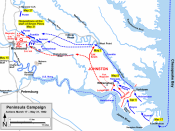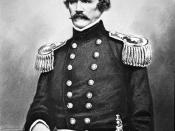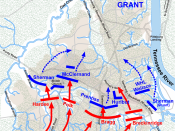Bull Run (Manassas):
Bull Run, the first major battle of the Civil War, was fought in Virginia, near Manassas, on July 21, 1861. The main general of the Federal army was Brigadier General Irwin McDowell, whose forces consisted of 30,000 men split into five divisions. General Joseph E. Johnston led the Confederate army, with about 22,000 men, though his army was not yet organized. Bull Run was fought to defend Richmond, which the Union thought they could rush, and end the war quickly. McDowell's troops suffered greatly from inexperience, but his plans were designed for experience troops. This gave the Confederates time to dig in, and when the slow-moving Union army finally reached the battlefield, lack of coordination between officers didn't allow the Union to take advantage of its superior numbers. The battle was largely a stalemate until the arrival of Confederate reinforcements, who forced the Union to retreat back to Washington.
In this battle, the Union suffered about 2900 casualties, and the Confederates had about 2000. This battle, though a Confederate victory, was not very decisive.
Shiloh:
After the losses of Fort Henry and Fort Donelson, the Confederates gave up Tennessee and retreated to Mississippi. General Grant followed them to Corinth, Mississippi, where he was so certain that the Union would take the offensive that he didn't even set up defensive positions. Confederate Generals Sydney Johnston and P.T. Beauregard launched a surprise attack on April 6, 1862. Grant's army, consisting of over 58,000 men, quickly set up defensive positions. Johnston's army, consisting of only 40,000 men, managed to push Grant back to the Tennessee River, where he dug in for the night. The next morning, aided by reinforcements, Grant counter-attacked and drove the Confederate army, led by Beauregard because Johnston had been killed the previous day, off the field.



War
This piece is good synopsis of major circumstance and fact. It is easily read and readily comprehended. However, it lacks, for me, any sense of what war is, why this war was, and what was it like for the players. As brief summaries, this stands well enough, but telling, insightful commentay it is not.
9 out of 9 people found this comment useful.